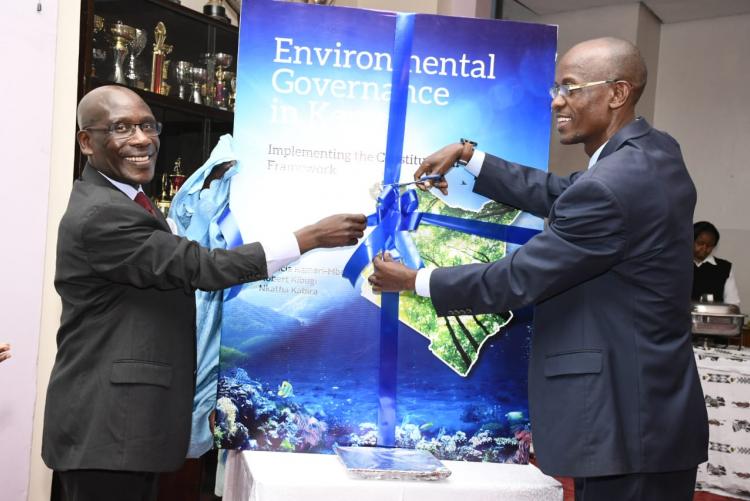The publication of the book 'Environmental Governance in Kenya' was a notable feature at the 5th Association of Environmental Law Lecturers in African Universities (ASSELLAU) Conference on GMOs in Africa, held on August 20-23, 2023.
In a significant stride towards advancing knowledge and understanding in the realm of environmental governance, the University of Nairobi proudly hosted the launch of a groundbreaking book titled "Environmental Governance in Kenya: Implementing the Constitutional Framework." This momentous occasion, graced by esteemed figures from academia and government, served as a platform to reflect on Kenya's journey in upholding sustainable development principles and environmental stewardship since the inception of the 2010 Constitution.
The event commenced with the warm welcome of attendees by the Vice Chancellor of the University of Nairobi, Professor Julius Ogeng'o. The Vice Chancellor emphasized the importance of environmental law and governance and the University's commitment to fostering a culture of scholarly excellence was underlined as a testament to its involvement in hosting significant conferences and producing impactful books in the field.
The Vice Chancellor's address highlighted the impressive collaboration that led to the creation of the book, engaging diverse authors - notably, a significant number of young talents who are carrying the torch of environmental law into the future. ‘’This collaboration is a testament to the vibrant academic community at the University of Nairobi and its ongoing contributions to global environmental discourse’’.
Recollections of achievements and landmarks in environmental law resonated through the Vice Chancellor's words. He brought to light the University of Nairobi's pivotal role in the 2004 IUCN Academy of Environmental Law Colloquium, which featured luminaries such as the late Nobel laureate Professor Wangari Maathai. The Vice Chancellor underscored how such events have enriched the University's reputation as a hub of environmental scholarship.
The growth of the Association of Environmental Law Lecturers in African Universities (ASSELLAU) was highlighted, tracing its roots back to the University of Nairobi in 2004. The University's continued involvement and support of ASSELLAU demonstrated its unwavering commitment to advancing environmental law education and collaboration on the continent.
Augustino Neto, a Technical Advisor to the Cabinet Secretary for Environment, Climate Change, and Forestry, Hon. Soipan Tuya, stood in on behalf of the Cabinet Secretary at the Ministry of Environment, Climate Change, and Forestry. He expressed his profound appreciation for the occasion, recognizing the significance of environmental governance within the framework of sustainable development. Mr. Neto stressed that the book's exploration of Kenya's progress in implementing constitutional provisions on environmental governance since 2010 was of paramount importance.
In his address, Mr. Neto acknowledged the historical challenges humanity has faced in ensuring good environmental governance, tracing the evolution of efforts to balance socio-economic activities with environmental preservation. The transformative nature of the Kenyan Constitution, with its commitment to a clean and healthy environment, was highlighted as a cornerstone for upholding environmental rights.
He further commended the collaborative efforts that led to the creation of the book, noting its relevance to her own ministry's responsibilities. The book's comprehensive coverage of various environmental issues underpinned its significance as a resource for policy development, legal analysis, and scholarly research. Particularly noteworthy was the book's chapter on the role of language in environmental governance, authored by a Judge of the Environment and Land Court.
Mr. Neto reaffirmed the government's dedication to climate action and sustainable development, drawing attention to imminent initiatives such as the 2023-2027 National Climate Change Action Plan. She underscored the importance of leveraging scholarly insights, like those encapsulated in the book, to inform national policies and international commitments under the Paris Agreement.
Professor Winfred Kamau, the Dean of the Faculty of Law, took the opportunity to underscore the significance of the book launch. As the first scholarly output dedicated to assessing Kenya's journey in environmental governance under the 2010 Constitution, the book summarizes over a decade's worth of experience in this domain. Its aptly titled theme, "Environmental Governance in Kenya: Implementing the Constitutional Framework,"
The Dean lauded the collaborative efforts of the Faculty of Law in conceptualizing and editing the book. With 27 chapters spanning a wide range of topics, including a comparative study on Uganda, the book stood as a testament to the Faculty's commitment to advancing knowledge in the field of environmental law.
On her part, Director, Law Division, UNEP, Prof Patricia Kameri-Mbote lauded all the authors who contributed to the success of the book. This book, 'Environmental Governance in Kenya' is coming 13 years after the adaptation of the constitution in Kenya. She further highlighted the six chapters in the book which include; Ethics culture and traditional knowledge, Land and environmental governance, wildlife conservation &management and renewable energy.
She also acknowledged the efforts and contributions of the late Prof. Okidi an outstanding environmental law scholar, a great contributor to governance and leadership in Kenya. Professor Okidi developed and executed competent teaching and research in environmental law and policy his unwavering commitment in building capacity in this area led him to earn the title, “the father and mentor” of environmental law title in Africa and beyond. Prof. Charles Odidi Okidi was an academic who has greatly contributed to the development of environmental law, not only in Kenya but also globally; and dedicated his life to seeking to improve the manner in which the environment is governed.
The launch of "Environmental Governance in Kenya: Implementing the Constitutional Framework" marked a significant milestone in the ongoing discourse on sustainable development and environmental stewardship. Through collaboration, scholarly exploration, and commitment to the principles enshrined in the Kenyan Constitution, the University of Nairobi displayed its dedication to shaping a greener and more sustainable future.
As the book embarks on its journey to inform policy, guide research, and inspire the next generation of environmental scholars, its significance will continue to echo not only within the academic community but also within the broader context of environmental governance in Kenya and beyond.

